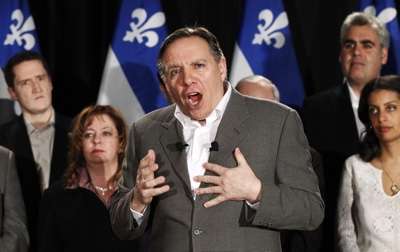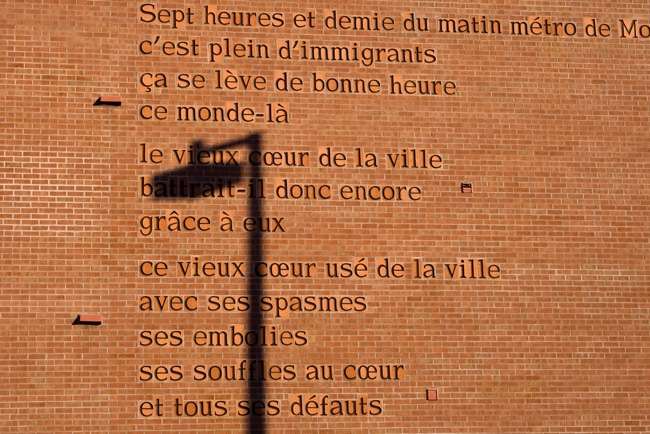Ethnic Nationalists Won the Quebec Election. What Fueled Their Rise?
Don't mistake this election for a Trump-inspired victory - Quebec's toxic anti-immigration politics are home grown.

To the surprise and chagrin of multicultural Canada, it turns out that Quebec separatism, long thought a dead movement, was actually in hibernation. The Coalition Avenir Quebec (CAQ) won a majority government, ousting the immigrant-friendly centrists and trouncing the establishment separatists. The victory marks the first time since 1966 that the province won't be governed by either the left-leaning Liberals or the social democratic separatist Parti Québécois.
The CAQ is only seven years old but its agenda should have a familiar ring to Americans. The party combines populism and center-right economic policy prescriptions with a brand of hardline ethnic nationalism that would make Stephen Miller blush. Premiere-designate Francois Legault aims to cut immigration by 20 percent, strengthen the province's existing ban on face covering, and expel newcomers who fail a test of French literacy and "Quebecois values."
Why is this happening in Canada? Wasn't Canada supposed to be a gentle haven of multiculturalism with a bilingual, bhangra-dancing prime minister, that opened its borders to 55,000 Syrian war refugees and a steady stream of American exiles self-deporting from Trump's America?
The temptation to see Trump as a bellwether for La belle province should be resisted. Nor can we blame Canada for Quebec's nationalistic turn. Though it's known as the Great White North, Canadians overall have maintained positive attitudes towards immigrants of every hue and shade for the last 20 years, even as the numbers of foreign born have swelled to over 20 percent of the population.
No, the forces bringing the caquistes to power in Quebec City are home grown and they've been a long time in the making. Hostility toward immigrants is deeply embedded in Quebec's separatist political culture, predating Trump's candidacy by decades, traceable to the failed 1995 referendum on Quebec independence.
The separatists lost that contest, which would've redrawn the map of North America, by the agonizingly close vote of 50.58 percent to 49.42 percent. When the final results were tallied, and it became clear to all that Canada would not break apart, Quebec's separatist Premier (and Captain Kangaroo lookalike) Jacques Parizeau infamously pointed the finger at immigrants for shattering the dream of an independent, French-speaking nation.
"It's true, it's true we were beaten, basically, by what? By money and ethnic votes, essentially," ("C'est vrai qu'on a été battus, au fond, par quoi? Par l'argent puis des votes ethniques, essentiellement") said a belligerent Parizeau, going off script, to an audience of his howling supporters at the Palais des Congress in Montreal.
Many understood "money" as a rhetorical jab at Montreal's Jewish community. As a culturally distinct minority of English-speaking Canadians, Jewish Quebeckers overwhelmingly opposed nationhood. The premiere's raw remark so succinctly summed up the post-referendum resentment that it's still periodically revived, 23 years later, whenever Canadian pundits wish to remind readers how ugly nationalist politics can be.
Ugly though it was, Monsieur Parizeau had a point. Immigrants who've chosen Canada as their home have never been persuaded to abandon it. And while most of Quebec's immigrants are native French speakers, few take interest in the acrimonious language wars that animate the separatist cause. With the 1995 referendum decided by a single percentage point, immigrants are arguably the reason why Quebec remains a Canadian province today.
Separatists didn't always see immigrants as an obstacle to nationhood. Gérard Godin, a poet-politician, and the first immigration minister of the Parti Québécois, argued in the early 1980s that foreign-born citizens were essential to the project of francophone sovereignty. Immigrants, he hoped, would be welcomed on their arrival in the province; in time, they would come to self-identify as Québécois and then they would vote for independence.
Godin's 1983 ode to immigrants, "Tango de Montréal," is written in brick outside of Montreal's Mont Royal metro station.
Seven thirty in the morning in the Montreal metro
it's full of immigrants
they get up early
in that worldso if the old heart of the city
is still beating
it's thanks to them.

Editor's Note: As of February 29, 2024, commenting privileges on reason.com posts are limited to Reason Plus subscribers. Past commenters are grandfathered in for a temporary period. Subscribe here to preserve your ability to comment. Your Reason Plus subscription also gives you an ad-free version of reason.com, along with full access to the digital edition and archives of Reason magazine. We request that comments be civil and on-topic. We do not moderate or assume any responsibility for comments, which are owned by the readers who post them. Comments do not represent the views of reason.com or Reason Foundation. We reserve the right to delete any comment and ban commenters for any reason at any time. Comments may only be edited within 5 minutes of posting. Report abuses.
Please to post comments


The CAQ is only seven years old but its agenda should have a familiar ring to Americans.
Not if it has a Frog accent it shouldn't.
And yet, they had never won before now. Why is that? What could possibly have changed? Maybe these lovely immigrants doing things like running dozens of people down with a van in Toronto perhaps?
This has nothing to do with Trump. It is about the Canadian government's unwillingness to fullfill the basic duty of protecting it's citizens from foreign agression.
And that's how Canadians see it.
Quebec is very protective of its culture and it's not surprising they voted CAQ. The Liberals were seen to be a little 'too openy'.
People aren't stupid and feel Trudeau is just an incompetent asshat with his bull shit on immigration. This was a brutal result for the Federal liberals.
As for the CAQ, I wanted to give them a chance but Legault's true colors sprung out and I don't like him. They have have an incoherent message with the anglo members mostly Federalists thinking one way, and its leader and the nationalist faction another. I don't know how this will work in the long-run.
Them and their bull shit on language I can't accept. Plus, they're supposed to be for business but don't mind the politicized circus in subsidized daycare and carbon taxes.
The economy under the Liberals in Quebec was very good ironically enough. For the first time in history our bond rating was better than Ontario and they kept the $15hr min. wage at bay.
> Maybe these lovely immigrants doing things like running dozens of people down with a van in Toronto perhaps?
Alek Minassian was born in Canada.
(Sorry to confuse you with a fact.)
The party combines populism and center-right economic policy prescriptions with a brand of hardline ethnic nationalism that would make Stephen Miller blush.
You mean like laws where signs have to be in French? That would be an eye-opener.
The French Canadians were conquered by the British in the 7 years War. They never wanted to be part of England or Candada. They just got forced into a union with English Canada. I really don't blame them for wanting to keep their French culture. Everyone knows it is French. So, how can you move there and then bitch about everything being in French?
Pfft, John, Canada has got it good. They have to deal with the French. You and I have to deal with Mexicans. BUILD DUH WALL!!!
Well, statistically that's a factual statement! The French don't have ultra low incomes that require everything to be subsidized for them, commit crimes at higher rates, etc. They just talk funny, have dumb mustaches, and wear silly striped shirts and eat lots of baguettes 🙂
The real question is how dare they run on the xenophobic platform of "defending" their culture? From what? Immigrants who want to move there and work? I mean, we know that no matter how many people move there, it won't change the culture in any way at all. And even if it did, it would be wrong for these new Quebecois to have the old culture foisted upon them against their will. The locals should obviously have to adopt the new Quebecois culture.
Guess everyone didn't buy into what was being sold. The pendulum swings.
If being in a union with English Canada means having President Zoolander let Jihadists lunatics into the country to murder you because he thinks "they add so much to Canada", maybe going French isn't so bad.
Globalist is a cancer that only Nationalism can cure and the cure is spreading like wildfire.
Every immigrant is a valadictorian who just wants to open a delicous food truck. Don't you know that?
Todd,
I'm getting tired of this Leftist claptrap you guys spew to get into your SPofA meetings so you can pick up gay boys. When it comes time for the annual Reason teleathon you can be sure that this Kentucky Reason supporter is going to review his $5 donation to what once was a fine magazine that used to write hard-hitting exposes on Klinton Kash, but now seems content to publish Soros' agenda for a National Socialist America. What happened to you guys?
I look forward to sopping up the angst-filled, copy-pasted, bigoted tears of the good Rev. Come right the wrongs of the Frenchmen, bitter clinger.
Right, Quebec separatists didn't always see immigrants as an obstacle to their aspirations -- but then reality jumped up in their face and they adjusted their beliefs to match it.
Justin Trudeau calling an ethnic Quebecoise a racist who had no place in Canada had much to do w/ it is my guess. His stupidity is a gift to his opponents.
"Don't mistake this election for a Trump-inspired victory ? Quebec's toxic anti-immigration politics are home grown."
Whuh whuh whut?
Everything bad in the world is Trump's fault!
"To the surprise and chagrin of multicultural Canada, it turns out that Quebec separatism, long thought a dead movement, was actually in hibernation"
To the surprise of no one with a brain.
"With the 1995 referendum decided by a single percentage point, immigrants are arguably the reason why Quebec remains a Canadian province today."
What is this article doing on Reason? It's been honest about Trump and immigration. That's not allowed around here.
But note the admission.
The Quebecois gave away power over their self determination through the import of foreigners with different values than they had. In democracies, polities are ruled by the people. Import new people with new values, and you've got a new polity.
The old former heart of the town,
with its spasms,
its embolisms,
its heart murmurs,
and all its faults.
Krainin sounds Russian...
For years I have asked Reason to explore Quebec's discriminatory language laws and how it differs in North American and negatively impacts, to me anyway, the province and the concept of liberty.
Instead, Quebec gets noticed because Trump.
Fuck Parizeau. /spits on grave.
It's a fairly straightforward lesson in the fact that the realities of nationalism, culturalism and even race remains messy and resistant to being jammed into the convenient little boxes that liberals and their acolytes at places like Reason so ardently enjoy. It is here, there, and everywhere. It is black, white, asian and Hispanic. It is Christian and Muslim. There is nothing really to be done about it, so just get used to it.
They did. OTOH, the Canadian federal government did shovel a lot of money trying to influence the result (some illegally, it appears.) I don't think it's a good idea to blame the money spent by the other side trying to convince things, but there is a plausible alternative explanation.